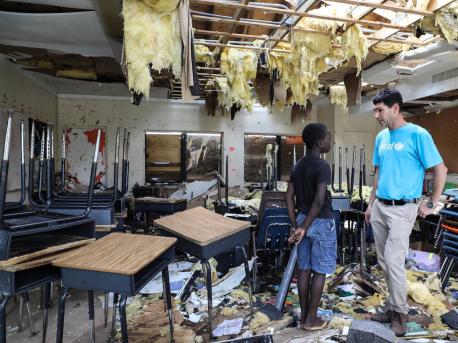
A Struggle for Survival in the Bahamas After Hurricane Dorian
Hurricane Dorian began its sweep through Abaco and Grand Bahamas islands on September 1, ripping off roofs, flattening houses and killing 50 people. Now an estimated 70,000 people — including 18,000 children and adolescents — are struggling to survive the devastating effects of the strongest hurricane in Bahamas history.
Central Abaco Primary School has been destroyed, as have all the schools in Marsh Harbour, Abaco Island. The shell of the school building is serving as a temporary shelter for families who lost their homes in the ferocious Category 5 storm.

"The school — did you see it?" Metory, 16 (right) asked her younger sister, Brianna, 14, outside the Central Abaco Primary School. "Everything is finished. There are no classrooms, no furniture, nothing. Just like our home. Everything is on the ground." © UNICEF/UN0342063/Noorani

Stunned families line the school's outdoor corridors, the magnitude of the loss still sinking in. Preliminary reports indicate that flooding may have compromised water and sanitation systems, putting children and families at risk of contracting waterborne diseases. The first shipment of nearly 1.5 tons of UNICEF humanitarian supplies arrived in Nassau, Bahamas on September 8, including more than 400,000 water purification tablets and several 5,000-liter tanks containing enough safe drinking water for at least 2,000 people. © UNICEF/UN0342039/Moreno Gonzalez

Ninety percent of infrastructure in Marsh Harbour has been damaged or destroyed. Above, Joochim Maseline cradles her sleeping 2-year-old daughter, Stacy. The single mother and her three children lost everything when their home was wrecked by Hurricane Dorian. © UNICEF/UN0342304/Noorani

"I am a single mother," said Maxenat Gerda, holding her 16-month-old daughter, Christ Bernaida, in a classroom at the Central Abaco Primary School. "I have one other daughter, age 11, in Haiti. My home is completely destroyed. I cannot leave Abaco. I have nowhere else to go. I don't know what to do. I have no family, no one I can seek help or support from." © UNICEF/UN0342069/Noorani

Hurricane Dorian's maximum sustained winds reached 185 mph, snapping trees like twigs and smashing homes into toothpicks. Survivors funnel gasoline out of destroyed cars to transport the injured to medical facilities. Above, a damaged school bus sits outside St. Francis Church in Marsh Harbour, Abaco. © UNICEF/UN0342308/Nooran

UNICEF staff are on the ground, assessing residents' access to critical services including health, education, shelter, water and sanitation, and providing urgently needed supplies. Above, on September 7, UNICEF Regional Emergency Specialist Hanoch Barlevi talked to a nurse in one of the main hospitals of Marsh Harbour Town. © UNICEF/UN0342029/Moreno Gonzalez

Marie Evelyn, 46, sits outside a classroom at the Central Abaco Primary School where she is living with her son Anthony, 13, and her daughters, 26-year-old Nerlande and 15-year-old Britney. "I finished grade 9 already and was about to start grade 10, but just like our house, our school is totally gutted," said Britney. "I am a good student. I want to finish high school, and go to college. I want to become a doctor and help my people." © UNICEF/UN0342061/Noorani

UNICEF has issued an initial target of $4 million to meet the immediate urgent needs of children for safe water, sanitation and hygiene in the Bahamas, along with nutrition and psychosocial support. © UNICEF/UN0342036/Moreno Gonzalez
"Children and their families who survived the hurricane have lost their homes, their livelihoods, their relatives, and have been left with little water or food," said Youssouf Abdel-Jelil, UNICEF Deputy Regional Director for Latin America and the Caribbean. "The clock is ticking for them to receive humanitarian assistance."
Top photo: On September 7, 2019, in Marsh Harbour, Abaco Island, Bahamas, 10-year-old Torres talks to UNICEF’s Regional Emergency Specialist Hanoch Barlevi in the ruins of his classroom at the Central Abaco Primary School, now serving as a temporary shelter for displaced families. Torres lost his father, his home and all his possessions during Hurricane Dorian, the strongest hurricane in Bahamas history. © UNICEF/UN0342041/Moreno Gonzalez
HOW TO HELP
There are many ways to make a difference
War, famine, poverty, natural disasters — threats to the world's children keep coming. But UNICEF won't stop working to keep children healthy and safe.
UNICEF works in over 190 countries and territories — more places than any other children's organization. UNICEF has the world's largest humanitarian warehouse and, when disaster strikes, can get supplies almost anywhere within 72 hours. Constantly innovating, always advocating for a better world for children, UNICEF works to ensure that every child can grow up healthy, educated, protected and respected.
Would you like to help give all children the opportunity to reach their full potential? There are many ways to get involved.



